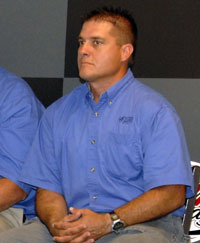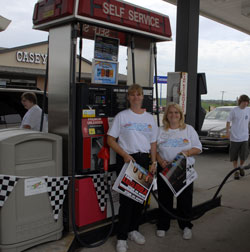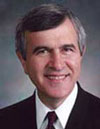 I think the logo for the Iowa Indy Corn 250, presented by Ethanol is very nice. It really looks good on the lawn in between the track and the pits here at Iowa Speedway.
I think the logo for the Iowa Indy Corn 250, presented by Ethanol is very nice. It really looks good on the lawn in between the track and the pits here at Iowa Speedway.
The Ethanol Promotion and Information Council is very involved in the promotion of this race, working very closely with organizations like the Iowa Corn Growers Association and Pioneer Hi-Bred. EPIC’s executive director Tom Slunecka was in the media center this afternoon. Tom was happy. And if Tom’s happy, I’m happy (EPIC is the founding and primary sponsor of Domestic Fuel).
I got him to sit down for a minute and talk about how he thinks it’s going. He’s just as excited about this race as all the corn growers I’ve spoken with this week. He says that the work EPIC has been doing to create a brand that consumers are aware of and trust is really paying off and venues like this race as well as all the IRL races have been key to showcasing the performance value of ethanol.
You can listen to my interview with Tom here: [audio:http://www.zimmcomm.biz/epic/iowa-corn-07-slunecka.mp3]


 It’s practice time here at the Iowa Speedway for the IndyCars. Here’s Jeff Simmons leaving the pits for the first session which was delayed this morning due to some foggy weather problems.
It’s practice time here at the Iowa Speedway for the IndyCars. Here’s Jeff Simmons leaving the pits for the first session which was delayed this morning due to some foggy weather problems. We’re hoping that those numbers improve here at the track tomorrow.
We’re hoping that those numbers improve here at the track tomorrow. Tim Recker is an Iowa corn grower and the president-elect of the
Tim Recker is an Iowa corn grower and the president-elect of the  One of the ethanol pump promotions coordinated by the Ethanol Promotion and Information Council this week was held at
One of the ethanol pump promotions coordinated by the Ethanol Promotion and Information Council this week was held at  Jim Sturdevant has joined POET as its new director in POET’s partnership with the U.S. Department of Energy to build a commercial cellulosic ethanol production facility.
Jim Sturdevant has joined POET as its new director in POET’s partnership with the U.S. Department of Energy to build a commercial cellulosic ethanol production facility. The National Biodiesel Board (NBB) applauded the action in
The National Biodiesel Board (NBB) applauded the action in 
 * Extension of the biodiesel tax incentive through 2010. The provision is based on legislation introduced this year by Representatives Earl Pomeroy (D-ND) and Kenny Hulshof (R-MO).
* Extension of the biodiesel tax incentive through 2010. The provision is based on legislation introduced this year by Representatives Earl Pomeroy (D-ND) and Kenny Hulshof (R-MO). The
The  Agriculture Secretary Mike Johanns is disappointed with the 2007 Farm Bill he sees developing in the House Agriculture Committee for a number of reasons. One of them is lack of funding for cellulosic ethanol research.
Agriculture Secretary Mike Johanns is disappointed with the 2007 Farm Bill he sees developing in the House Agriculture Committee for a number of reasons. One of them is lack of funding for cellulosic ethanol research.